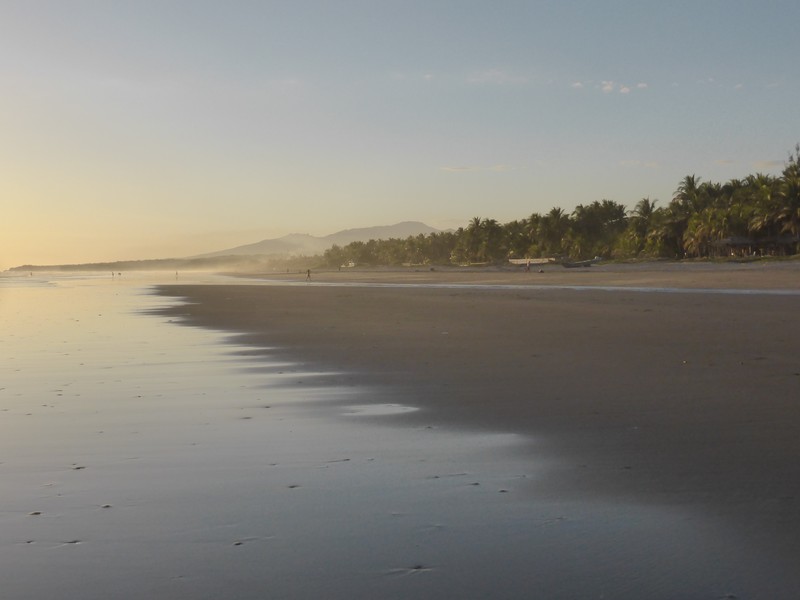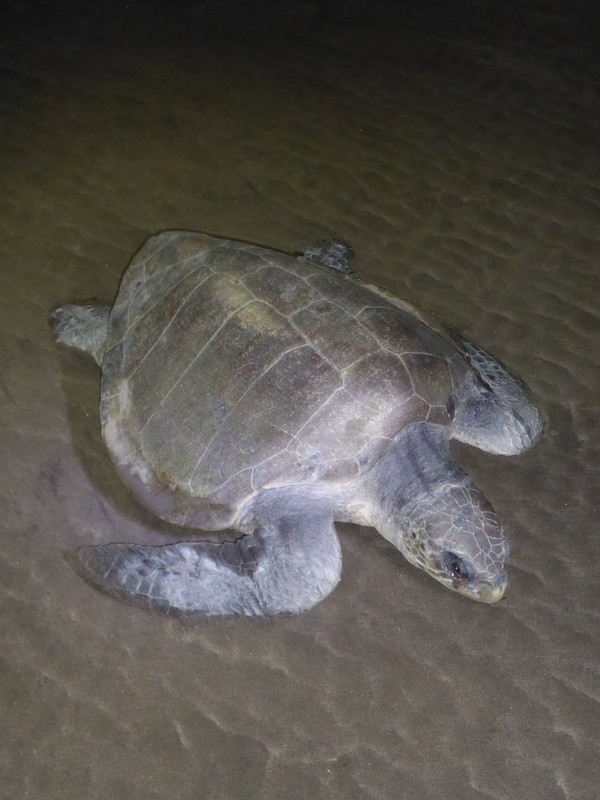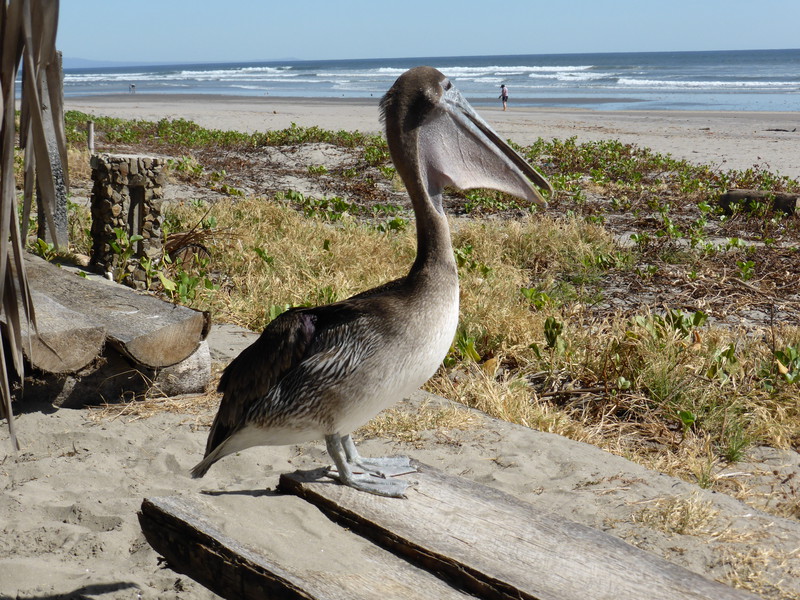
Playa Esteron, on the eastern coast of El Salvador near the border with Nicaragua, is everything we'd hoped Playa El Tunco would be but wasn't. The beach is an absolute gem, stretching out into the distance like a salt flat while gentle surf breaks into long lines of speckled foam. The sand, while still slightly grey, is a lot more golden than the black sand further west, and every photograph you take along the beach is an exercise in perspective and vanishing points. It's utterly charming.

And not only is it charming, but it's almost completely deserted. The nearest settlement, El Cuco, is about 3km west along the beach, and apart from a few houses and restaurants in the dunes behind the beach, Esteron is quiet, sleepy and generally ignored by the younger backpacker set, who tend to skip eastern El Salvador in favour of getting into Nicaragua in one long shuttle journey from El Tunco to León. After the slightly irritating beer crowds of El Tunco, this was a major blessing, and we easily fell under its spell, spending long days lazing in the sun, walking along the soft sandy beach, reading holiday novels in swaying hammocks, trying out surfing for the first time, and drinking piña coladas under perfect blue skies. For a few days, we did nothing but live the easy life.

This was made even easier by the hotel we stayed in, which consisted of a beachside collection of huts and rooms, a small bar, a restaurant, and an emphasis on wildlife conservation. La Tortuga Verde ('The Green Turtle') is run by an American ex-surfer called Tom Pollak, who has started making a name for himself as a turtle conservationist. The problem with El Salvador, as with many countries where turtles nest, is that the locals just love eating turtle eggs, so they prowl the beaches at night, looking for turtles dragging themselves up the beach to lay eggs. When they find one, they wait for her to dig a hole and finish laying, and then they pick the turtle up, move her to one side, and simply pluck the whole clutch of eggs, one by one, from the elbow-deep hole. Meanwhile, the turtle, who goes into a bit of a trance while laying, starts to flick sand backwards over what she thinks is her brood, and when she thinks it's covered, she heads back to the sea, completely unaware that her offspring is now top of the menu.

It's a mammoth task to stop a tradition that's an embedded part of a country's culture, so in an attempt to stop the turtles becoming extinct, Tom offers to buy the eggs from anyone who collects them, and then plants them in a hole in the hotel grounds. When they hatch, happy residents get to release them into the sea, so it's a win-win situation; the locals make money from harvesting eggs, the turtles get to hatch, and the residents of Tom's hotel get to be involved in turtle conservation.

January is not the season for turtles laying eggs, but we lucked out. One night, when we were sitting out by the beach enjoying a late night beer, Tom ran out, shouting that there was a turtle on the beach, and when we looked, there she was, right in front of the hotel and just a few yards from where we'd been drinking. As our small group of tourists arrived with our torches and cameras, the turtle was flicking sand pointlessly while the hotel's nightwatchman pulled eggs from a large hole in the beach. I assumed that the nightwatchman had spotted the turtle and was doing a good deed before the poachers came along, but no; it turned out that the nightwatchman was stealing the eggs and had been trying to keep the whole process hidden from Tom, but when he didn't come when called, Tom got suspicious and spotted him digging out the eggs. So Tom had to negotiate a deal to buy the eggs from his own member of staff, as otherwise they'd have disappeared into the pot. It just goes to show, when even the turtle man's staff are happier to eat the eggs than preserve them, you've got a real uphill battle on your hands.

Tom also saved a pelican while we were there. He took a boat out to the gulf islands off the coast where El Salvador and Nicaragua meet, fully expecting to find a pelican somewhere out there with broken wings, as this is a common problem with these birds; they crash into the sea to catch fish, and it's not unknown for them to damage themselves in the process. A pelican with a broken wing is a pelican who will slowly starve to death, so periodically Tom goes out to look for damaged birds, and brings them back to the hotel to feed them and nurse them back to health. The pelican he brought back was actually missing half a wing, so it couldn't ever return to the wild, so the hotel now has a permanent resident in the form of Sam, the one-winged pelican.
Yes, Esteron really is a paradise; it has a perfect beach, endless sunshine and a feel-good environmental angle, and when you take the 45-minute walk up to El Cuco, where the locals come to party at the weekend, the crowds and litter are a bit of a shock. Long may Esteron retain its remote and charming character.
The Madcap Laughs

Unfortunately, I'm not sure it will for much longer. Tom, who sounds utterly amazing on paper, is what you might euphemistically call a 'character'. He has what he calls a TV show on an El Salvador cable channel, for which he films the turtle eggs being planted into his turtle sanctuary, as well as the releasing of the babies into the ocean. For this he dons a strange, green, mad-hatter's hat, grabs a fuzzy microphone, and launches into the campest and most bizarre showbiz cameo role that I've ever seen performed on a tropical beach. His Spanish comes out with an utterly American accent, and his exuberance is... well, you know what American-style TV is like. I guess that publicity is publicity, even if it is just a home-made, hand-held-camera show for a tiny cable channel, but if I was trying to persuade the locals not to eat turtle eggs, I'm not sure I'd go for the 'insane foreigner' approach. Even the hotel's residents, whom he ropes into each filming session, getting them to announce their names and countries into the camera, look utterly bewildered by it all. If you want to see what I mean, take a look at a typical show on YouTube.

But then Tom is a 'character'. When you first meet him, he comes across as utterly camp, but one of the residents at the hotel when we were there was a young Russian girl, half his age, who used to be his girlfriend, so one assumes he just sounds that way; his public persona, though, is a strange hybrid of drag queen meets spoilt child. Within five minutes of meeting you, he makes the point (sometimes more than once) that the hotel is not run for profit – apart from the rooms and the restaurant, he adds quietly – and that he owns lots of property in downtown New York and is utterly loaded; he also boasts about having bought property all along the shore at Esteron, and is proud to take you on a tour round the Tortuga Verde, where there's quite a lot of building work going on as he adds more rooms and facilities. And although he insists that the whole operation simply exists to give jobs to the locals – and he says he pays his employees more than they would otherwise get, which is great – it's a bit hard to reconcile these landed-gentry boasts with the eco-friendly hippie image that he likes to portray. You can't help feeling that you're stuck in the middle of a rich kid's vanity project, and that didn't help us warm to our gregarious host, whatever his eco-credentials.

So despite this being paradise, it can be a bit odd at times, and talking to the other guests, we weren't the only ones feeling a bit weirded out by it all. Luckily, all you have to do is park yourself on the edge of the beach, crack open another bottle of Golden beer and drink in the astonishing sunset view, and all of a sudden the day-glo tinge of turtle madness evaporates in the face of nature at its most beautiful. And hey, if the self-indulgence helps to save the wildlife while providing well-paid jobs for the locals, then fair enough. There are far worse crimes than being odd.